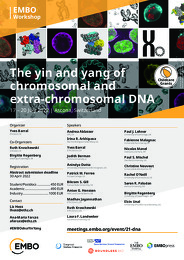About the Workshop
Eukaryotic cells maintain their genome as linear chromosomes in the nucleus and smaller, circular chromosomes in their autonomous organelles. Sporadically, they also contain non-chromosomal DNA, generally in circular form, due to recombination of chromosomal fragments, movement of DNA from mitochondria to the nucleus, uptake of extracellular DNA, or the presence of selfish DNA of endogenous or exogenous origin, like transposons and viruses. When it does not harm or kill the cell, this material may contribute to the evolution and structural dynamics of the genome. Reversely, selfish DNAs evolve sophisticated machineries to multiply and propagate independently of, but also frequently via chromosomes. During this meeting we will review recent insights on the complex relationships that chromosomes and extra-chromosomal DNAs entertain with each other, discussing how cells distinguish them, how their relationships contribute to the biology of the cell in health and disease, and affect genome plasticity and evolution. The intricate relationships between chromosomes and extra-chromosomal DNAs are raising fundamental questions in both basic and medical sciences. We will further conceptualize these questions and discuss how to best approach them experimentally and theoretically.
In addition to the invited speakers, selected abstracts will be chosen for short talks and presented during poster sessions. Registration is limited to 90 participants.
Images were provided by the Mischel, Manel, Kroschewski and Barral laboratories, which were then compiled to create the header image as designed by Ana-Maria Farcas.
About EMBO Courses and Workshops
EMBO Courses and Workshops are selected for their excellent scientific quality and timelines, provision of good networking activities for all participants and speaker gender diversity (at least 40% of speakers must be from the underrepresented gender).
Organisers are encouraged to implement measures to make the meeting environmentally more sustainable.







